|
|
|
Sort Order |
|
|
|
Items / Page
|
|
|
|
|
|
|
| Srl | Item |
| 1 |
ID:
155790
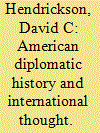

|
|
|
|
|
| Summary/Abstract |
This essay offers a constitutional perspective on the American encounter with the problem of international order. Its point of departure is the American Founding, a subject often invisible in both the history of international thought and contemporary International Relations theory. Although usually considered as an incident within the domestic politics of the United States, the Founding displays many key ideas that have subsequently played a vital role in both international political thought and IR theory. The purpose of this essay is to explore these ideas and to take account of their passage through time, up to and including the present day. Those ideas shine a light not only on how we organize our scholarly enterprises but also on the contemporary direction of US foreign policy and the larger question of world order.
|
|
|
|
|
|
|
|
|
|
|
|
|
|
|
|
| 2 |
ID:
178237
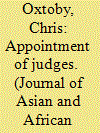

|
|
|
|
|
| Summary/Abstract |
South Africa’s Constitution provides multitudinous examples of clear breaks from past governance structures and practices. Regarding the judiciary, one of many significant changes has been in how judges are appointed. Prior to the onset of constitutional democracy, judges were appointed by the executive, with consultation with the senior judiciary but little or no scope for broader input from any other stakeholders. The Constitution established the Judicial Service Commission (JSC), one of the major functions of which is to recommend the appointment of judges. The JSC was intended to mark a decisive break with the previous appointment system, by creating a broad-based structure that includes politicians, lawyers and judges. The JSC interviews prospective candidates for judicial office in public and provides the opportunity for other stakeholders to engage in the process. This article assesses the performance of the JSC over the first 25 years of South Africa’s constitutional democracy. Several shortcomings will be discussed, including the failure of the commission to develop and apply clear and consistent criteria, challenges with implementing demographic transformation of the judiciary, managing the role of politicians and politics in the judicial appointment process, and an apparent aversion to appointing independently-minded judges, informed at least in part by a restrictive understanding of the principle of the separation of powers.
|
|
|
|
|
|
|
|
|
|
|
|
|
|
|
|
| 3 |
ID:
098011
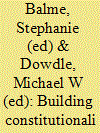

|
|
|
|
|
| Publication |
New York, Palgrave Macmillan, 2009.
|
| Description |
viii, 325p.
|
| Series |
Science po series in international relations and political economy
|
| Standard Number |
9780230600324, hbk
|
|
|
|
|
|
|
|
|
|
|
|
Copies: C:1/I:0,R:0,Q:0
Circulation
| Accession# | Call# | Current Location | Status | Policy | Location |
| 055141 | 342.51/BAL 055141 | Main | On Shelf | General | |
|
|
|
|
| 4 |
ID:
030589
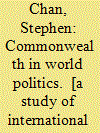

|
|
|
|
|
| Publication |
London, Lester Crook Academic Publishing, 1988.
|
| Description |
117p.Hbk
|
| Standard Number |
187091502X
|
|
|
|
|
|
|
|
|
|
|
|
Copies: C:1/I:0,R:0,Q:0
Circulation
| Accession# | Call# | Current Location | Status | Policy | Location |
| 031203 | 909.09171241/CHA 031203 | Main | On Shelf | General | |
|
|
|
|
| 5 |
ID:
180623
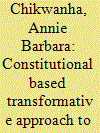

|
|
|
|
|
| Summary/Abstract |
The article reviews contemporaneous security sector reform (SSR) models and proposes an Afrocentric human security oriented alternative, a constitutional based transformative approach. The post-colonial security sector in African countries continues to struggle with converting and infusing the nationalist liberators’ underlying values into the new institutions and this has kept post-independence security provision skewed in favour of the new political elite. Post-liberation war African countries have undergone series of SSR that depicted some semblance of stability during the transition from violent liberation struggles that were mostly fought from exile, yet the possibility of intractable conflict is real. Decades after the retreat of colonialism, the national security apparatus in the region remains a source of both instability and insecurity in many countries. This proposed SSR constitutional based transformative framework is underpinned by three core concepts: participation; accountability and transparency that undergird the core of a participatory anchored security sector governance (SSG) approach. These elements are critical factors for influencing the transformation and decolonising of the post-colonial security sector in Africa into human security focused systems.
|
|
|
|
|
|
|
|
|
|
|
|
|
|
|
|
| 6 |
ID:
129641
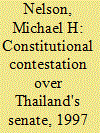

|
|
|
|
|
| Publication |
2014.
|
| Summary/Abstract |
One key component of modern constitutions is the representative system. The often-contested codification of this system over time in democratizing political orders depends on a number of factors, such as the existing institutional setting, the power relations of important political actors, and the ideational resources, or political culture, available to the constitution drafters. This article examines the ideational resources drawn on by the members of Thailand's 2007 Constitution Drafting Committee (CDC) in debating and deciding the shape of the National Assembly's upper house, the Senate. This is mainly done by analysing the word-by-word minutes of the meetings. The respective processes of the 1997 CDC are described more briefly in order to provide background on an area of constitutional contestation that found its latest expression in November 2013, when the Constitutional Court invalidated the National Assembly's constitutional amendment, which would have reintroduced a fully elected Senate. The article contextualizes these developments by reference to mass protests against the "Thaksin regime" that had been organized since November 2013 by the so-called People's Democratic Reform Council (PDRC).
|
|
|
|
|
|
|
|
|
|
|
|
|
|
|
|
| 7 |
ID:
129632
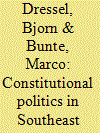

|
|
|
|
|
| Publication |
2014.
|
| Summary/Abstract |
Over the last twenty-five years the constitutional landscape of Southeast Asia has changed tremendously. As in the rest of world, states in the region are dramatically alerting their constitutions, often putting in place institutional safeguard for individual rights, such as constitutional court and human right commission. Yet despite the numerous formal changes, actual constitutional practice in the region has been highly uneven. Four areas are particularly contested: constitutional drafting and design; individual and religious rights. The role of the military in constitutional politics; and the rule of law, court and justice. How states in Southeast Asia resolve unfolding conflicts in these four areas will be critical to how constitutionalism evolves in the region. Replacing traditional legal scholarship with a new perspective on how constitutional politics are contested in the region, this article seeks to advance the unfolding constitutionalism trajectories and assessing whether countries in the region are actually deepening constitutional practice in a Western liberal sense or whether the model that seems to be emerging is quite different.
|
|
|
|
|
|
|
|
|
|
|
|
|
|
|
|
| 8 |
ID:
162467
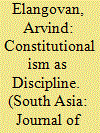

|
|
|
|
|
| Summary/Abstract |
Ironically, despite being acclaimed as one of the foremost biographers of the Indian Constitution, little is known about Benegal Shiva Rao (1891–1975) or his ideas about constitutionalism. By delving into Rao's published writings and his incomplete, unpublished autobiography, this essay reconstructs his idea of constitutionalism as one that primarily sought to discipline politics. However, I argue that such a view also leads to erasing the accounts of political conflict that comprise the history of the Indian Constitution. By analytically bringing together this curious triadic relationship between politics, constitutionalism and history, this essay explores how an isolated focus on constitutionalism leads to troubling historical amnesia.
|
|
|
|
|
|
|
|
|
|
|
|
|
|
|
|
| 9 |
ID:
127618
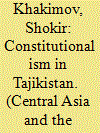

|
|
|
|
|
| Publication |
2013.
|
| Summary/Abstract |
This article examines how constitutionalism is taking shape in present-day Tajikistan and analyzes its main development stages in 1994 (the drawing up and adoption of the first RT Constitution), 1999 (the constitutional reform), and 2003 (the introduction of amendments and additions to the current RT Constitution).
This study defines the general features of constitutionalism of the transition period, which include the following:
1. The broad reception of foreign law, as well as implementation of the international legal provisions of human rights, the democratic foundations of statehood, the separation of powers, and the rule of law while retaining the regulations passed down from Soviet times.
2. The general contradictoriness and inconsistency of the constitutional rulemaking.
3. The transformation of certain provisions of the Constitution into a declaration of intentions, relating to their lack of correspondence to the real political and socioeconomic situation in the country.
It reveals the lack of correspondence between the content of the Constitution and the old legislation largely inherited from the Soviet past and presents the content of the constitutional reform carried out in 1999 within the framework of executing "The General Agreement on Establishing Peace and National Consent in Tajikistan."
The author analyzes the amendments and additions to the Constitution, the adoption of which was brought up at the 1999 referendum.
The article presents an appraisal of the constitutional reform of 2003 and examines the problems of carrying it out, during which favorable conditions were created for the emergence of authoritarianism in the country.
It also notes that Tajikistan's sociopolitical reality creates prerequisites for differences between the de jure and de facto constitution. This usually leads in practice to a certain shift from democracy to authoritarian methods of executing state power.
|
|
|
|
|
|
|
|
|
|
|
|
|
|
|
|
| 10 |
ID:
126366
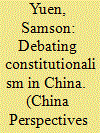

|
|
|
| 11 |
ID:
111198
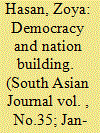

|
|
|
| 12 |
ID:
147884
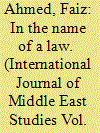

|
|
|
|
|
| Summary/Abstract |
In 1919, a new amir in Afghanistan named Aman Allah Khan launched an ambitious campaign to reorder his government into a constitutional monarchy. By 1923, Afghanistan had ratified its first constitution, supplemented by scores of legal and administrative codes. Whereas the latter have long been attributed to European borrowings or Kemalist imitation, this article uncovers two neglected features of Aman Allah's reformist project to argue that the making of Afghanistan's 1923 Constitution presents a distinctive path of state building in the region: Islamic legal modernism. First, by upholding the Hanafi school of Islamic jurisprudence as the basis of Afghan substantive law, Amir Aman Allah sought a cohesive national judiciary through the codification of fiqh, not European civil law. Second, by synthesizing the expertise of a diverse cast of Muslim scholars and professionals—from Afghan clerics to Ottoman and Indian technocrats recruited to Kabul—he attempted to avert a rift between “Islamic” and “secular” lawmaking.
|
|
|
|
|
|
|
|
|
|
|
|
|
|
|
|
| 13 |
ID:
117121
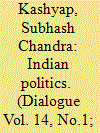

|
|
|
| 14 |
ID:
164817
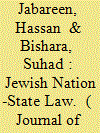

|
|
|
|
|
| Summary/Abstract |
This analysis explores the origins and constitutional implications of Basic Law: Israel – The Nation State of the Jewish People (hereafter the Jewish Nation-State Law), enacted by the Israeli Knesset in July 2018. It examines the antecedents of the legislation in Israeli jurisprudence and argues that most of the law's provisions are the product of precedents established by Israel's Supreme Court, specifically the court's rulings delivered post-Oslo. The authors contend that the “two states for two peoples” vision of so-called liberal Zionists paved the way for Israel's right-wing politicians to introduce this law. Their analysis holds that the law is radical in nature: far from being a mere continuation of the status quo, it confers unprecedented constitutional status on ordinary policies and destabilizes the prevailing legal distinction between the area within the Green Line and the 1967 occupied territories.
|
|
|
|
|
|
|
|
|
|
|
|
|
|
|
|
| 15 |
ID:
095083
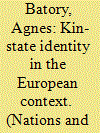

|
|
|
|
|
| Publication |
2010.
|
| Summary/Abstract |
The broad objective of this article is to explore the interaction between nationalism and Europeanisation, and the impact of this interaction on constitutionalism at the level of EU member states, using Hungary as a case study. The country reasserted its identity as a kin-state after regime change in 1990, with the relationship between ethnicity/national identity and political community repeatedly taking centre stage in political life and in the field of citizenship legislation. At the same time, the country actively pursued integration into the EU, including a constitutional amendment allowing accession. Despite the potential implications of joining a supranational political entity for the definition of political community, the two parallel processes remained largely disconnected in the political discourse and the broader debate on constitutionalism in the EU has found less resonance in domestic politics than controversy over citizenship and national identity.
|
|
|
|
|
|
|
|
|
|
|
|
|
|
|
|
| 16 |
ID:
027646
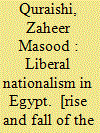

|
|
|
|
|
| Edition |
1st ed.
|
| Publication |
Allahabad, Kitab Mahal Private Ltd., 1967.
|
| Description |
vi, 245p.hbk
|
|
|
|
|
|
|
|
|
|
|
|
Copies: C:1/I:0,R:0,Q:0
Circulation
| Accession# | Call# | Current Location | Status | Policy | Location |
| 008209 | 962/QUR 008209 | Main | On Shelf | General | |
|
|
|
|
| 17 |
ID:
126328
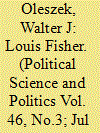

|
|
|
|
|
| Publication |
2013.
|
| Summary/Abstract |
During the 1950s, Isaiah Berlin wrote a famous essay entitled "The Hedgehog and the Fox." The point behind the title is that the hedgehog knows one big thing and the fox knows many things. From this distinction, Berlin suggests there are two intellectual types: one who relates everything to a single idea and the other who explores a diversity of ideas. It is difficult and unrealistic to pigeonhole Fisher as one or the other intellectual type. The reality is that Fisher combines both types. My sense is that Fisher's wide diversity of scholarly and policy-influencing accomplishments, and his skepticism of conventional wisdom, put him in Berlin's second category rather than first. However, my position at the Congressional Research Service (CRS) also prompts me to say, on the other hand, one big idea has animated Fisher's contributions to the academic and political/legislative worlds. That idea is highlighted in the title of one of his plethora of publications: Defending Congress and the Constitution (2011). Of course, when you write about the Congress and the Constitution, you analyze-like Berlin's fox-a host of interrelated ideas and relationships: history, law, the presidency, the judiciary, and more.
|
|
|
|
|
|
|
|
|
|
|
|
|
|
|
|
| 18 |
ID:
048649
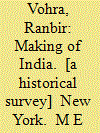

|
|
|
|
|
| Publication |
New York, M E Sharpe, 1997.
|
| Description |
x, 331p.pbk
|
| Standard Number |
1563246953
|
|
|
|
|
|
|
|
|
|
|
|
Copies: C:1/I:0,R:0,Q:0
Circulation
| Accession# | Call# | Current Location | Status | Policy | Location |
| 039153 | 954/VOH 039153 | Main | On Shelf | General | |
|
|
|
|
| 19 |
ID:
095084
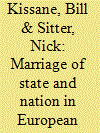

|
|
|
|
|
| Publication |
2010.
|
| Summary/Abstract |
This article maps out the role played by national identity in modern European constitutions. It does this by comparing its impact on constitutions across Gellner's time zones of European nationalism, and shows how the impact of nationalism has increased gradually over time, and is now strongest in Central and Eastern Europe. It concludes with a reflection on why this has been the case, and why constitutional politics have increasingly lent themselves to nationalist influences in the modern era.
|
|
|
|
|
|
|
|
|
|
|
|
|
|
|
|
| 20 |
ID:
184556
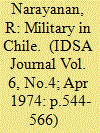

|
|
|
|
|
|
|
|